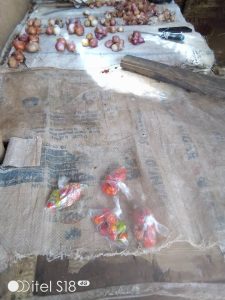By Abdulrasaq Kamaldeen

At the break of dawn, Oloruntoyin Fatimah, a 300-level student of English and Literary Studies, sprang from her bed with purpose. She meticulously thought of preparing her morning meal, determined to face the day and ensure she wouldn’t miss a moment of her lecture.
Thinking of how to get pepper, she went out to get some for her breakfast. Upon visiting the pepper vendor, she found the price of pepper had skyrocketed. The few peppers available were far beyond her budget, and she reluctantly bought a mere five peppers for ₦200.
This scarcity and high cost of pepper were unprecedented–leaving Fatimah disappointed and frustrated.
Stressing on her 100-level days, she said, “The scarcity of pepper in the school is frustrating.
“Pepper has never been this expensive from my time at 100 level until now. I am hoping that things will come back to normal.”
As someone who loves pepper, she found her meals lacking in taste and satisfaction, unable to savor the flavors she was accustomed to.
Muhammadjawad Oloruntoyin, a 300-level Law student, also expressed his dismay over the persistent pepper scarcity.
“I feel bad about the scarcity of pepper. Cooking without pepper makes the food unpalatable,” he said.
Soaring Commodity Prices
The removal of subsidies by President Bola Ahmed Tinubu has significantly impacted the socio-economic landscape of Nigeria. The elimination of the fuel subsidy is a key factor behind the scarcity and high cost of commodities, including pepper.
A report by Daily Trust stated that a basket of tomatoes soared to ₦120,000 at the beginning of June 2024, a record high. In 2021, the same basket sold for between ₦5,000 and ₦7,000. Although prices have since fallen to between ₦60,000 and ₦68,000 per basket, production continues to suffer from severe challenges.
Last year, over 500 farmers in Kano State alone lost more than 300 hectares of tomato crops, estimated at ₦17 billion, due to pest infestations, according to the leadership of the tomato growers in the state. Tomato farmers have faced persistent issues since February, with pests ravaging farms across Kura, Garun Mallam, Bunkure, and other irrigation sites.
Additionally, many farmers in states like Gombe, Kaduna, Katsina, Plateau, and other major tomato-producing regions have abandoned tomato farming due to these adverse conditions. The Tomato Growers Association of Nigeria (TOGAN) reported a loss of $17 billion in 2023 as a result of pest attacks.
Pepper Vendors React
Anas Muhammad, a pepper vendor on campus, attributed the scarcity to insecurity and insufficient rainfall in the northern part of Nigeria. He pointed out that Nigerians also contribute to the scarcity by hoarding pepper to sell at higher prices later.
“Mostly, the scarcity of pepper in Nigeria arises due to insecurity. The farmers who cultivate pepper are scared because of the insecurity. Also, if there is no rain on the farm, there will be no pepper. Truth be told, Nigerian pepper vendors also make the pepper scarce because they store it to sell at a higher price,” Muhammad explained.
Another vendor, Mustafa Issa, echoed these sentiments, citing the subsidy removal as a major cause of the scarcity. “What causes the scarcity of pepper is the removal of subsidies,” he said.
